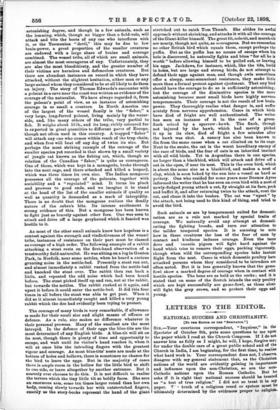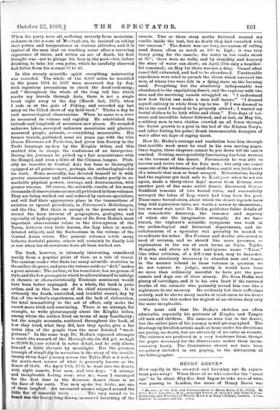LETTERS TO THE EDITOR.
NATIONAL SUCCESS AND CHRISTIANITY.
[TO TIM EDITOR OF THF " SPECTATOR:]
SIR,—Your courteous correspondent, "Inquirer," in the Spectator of October 8th, puts some questions to me upon the paper which I read at the Church Congress. If I do not answer him as fully as I might, he will, I hope, forgive me; for under the double care of a great public school and of the Church in India, I am beginning, for the first time, to realise what hard work is. Your correspondent does not, I observe, disagree with my general statement that, as the Christian nations of the world are evidently gaining in importance and influence upon the non-Christian, so are the non- Catholic nations upon the Roman Catholic. But he asks if it is right that national success should be treated as "a test of true religion." I did not so treat it in my paper. T truth of a religious creed or system must be ultimately determined by the evidences proper to religion.
When his party were all.snffering severely from mountain- aickness in the ascent of Mestagh-ata, he insisted on taking their pulses and temperatures at various altitudes, and it is typical of the man that on reaching water after a torturing experience of thirst, and within an ace of death, his first thought was—not to plunge his face in the pool—but, before drinking, to take his own pulse, which he carefully observed had fallen from his normal 86 to 49.
In this sternly scientific spirit everything noteworthy was recorded. The whole of the 6,500 miles he travelled in the years 1894 to 1897 were measured day by day, with ingenious precautions to check the dead-reckoning; and "throughout the whole of the long red line which marks my travels through Asia, there is not a single break right away to the day (March 2nd, 1897), when I rode in at the gate of Peking, and recorded my last entry on the 552nd sheet of my field-book." Thrice a day he took meteorological observations. When he came to a river he measured its volume and rapidity. He established the latitude and longitude of seventeen new places. He sounded unknown lakes, surveyed unknown mountains and glaciers, measured people, animals, — everything measurable. His former travels, published some six years ago with the title Genoa& Khorasan och Turkestan, had given him fluency in the Tnrki language spoken by the Kirghiz tribes, and this enabled him to escape the confusions of an interpreter. During his journeys he picked up a fair acquaintance with the Mongol, and even a little of the Chinese, tongue. Prob- ably no traveller in Central Asia has been so thoroughly equipped at all points—save, perhaps, the archmological—for his work. None, assuredly, has devoted himself to it with greater earnestness and enthusiasm, or, thanks partly to re- markable physical powers, courage, and determination, with greater success. Of coarse, the scientific results of his many thousands of observations are not all published in these volumes. They are being worked out and reduced by various specialists, and will find their appropriate place in the transactions of societies or special periodicals, in Petermann's .731itteilungen, and the like. But there is enough in the present work to attract the keen interest of geographers, geologists, and especially of hydrographers. Some of Dr. Sven Hedin's most important observations relate to the river-system of the Tarim, hitherto very little known, the Lop lakes (a much- debated subject), and the fluctuations in the volume of the Central Asian rivers. The present volumes settle many hitherto doubtful points; others will certainly be finally laid at rest when his observations have all been worked out.











































 Previous page
Previous page